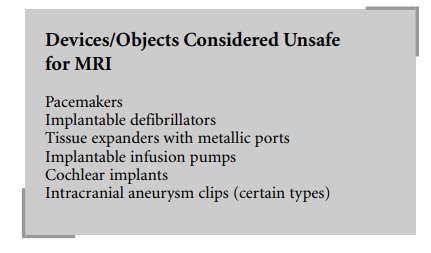Chapter: Clinical Cases in Anesthesia : MRI and the Down Syndrome Child
What are the magnetic field problems associated with MRI?
What are
the magnetic field problems associated with MRI?
The attractive force of the magnet exerts a
substantial pull on objects that are ferromagnetic. The major concern is that
these propelled ferromagnetic objects can lead to injury or lethal outcome to
patients or personnel.

Care must be taken to avoid the use of, or to
have in one’s possession, objects such as pens, scissors, clamps, stetho-scopes,
non-lithium batteries, ferromagnetic compressed gas cylinders, and other
objects that are ferromagnetic.
Patients with implanted ferromagnetic devices
or objects which include pacemakers, tissue expanders with metallic ports,
implantable defibrillators/cardioverters, implantable infusion pumps, cochlear
implants, and cer-tain types of intracranial aneurysm clips are generally
excluded from MRI studies. The magnetic fields of the MRI scanner can
potentially affect the function and safety of these devices. The newer aneurysm
clips contain non-ferrous material and are not considered to be a problem.
However, a thorough investigation of the type of aneurysm clip is required
before proceeding with the MRI study. Metallic-based substances such as eye make-up
or tattoos can produce local skin irritation during MRI scanning.
Metals that are known to be safe include
stainless steel, titanium, alloys, and nickel. Equipment that is made of
plastic is better for use in the proximity of the MRI magnet.
Related Topics